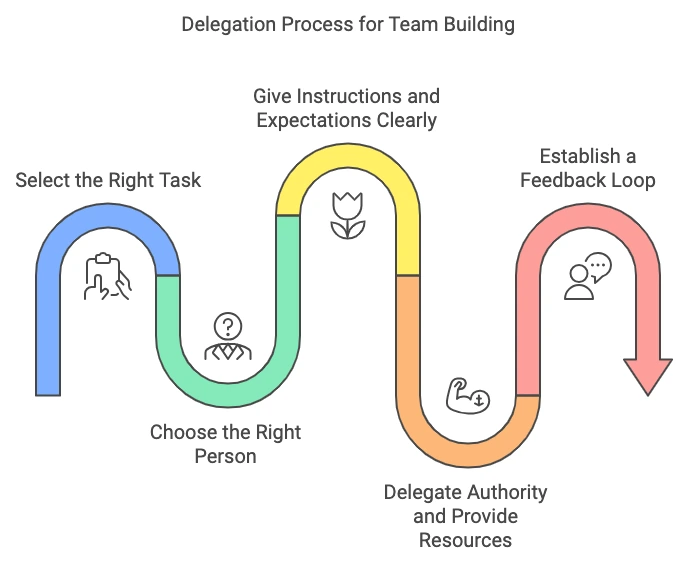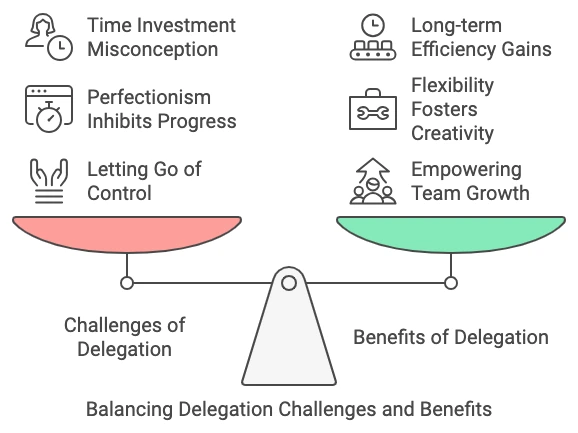Jump to the section
Key Learnings
#1
Understand the Power of Delegation
Delegation involves assigning tasks to team members based on their strengths, allowing leaders to focus on strategic objectives while ensuring accountability for outcomes.
#2
Use the Benefits of Delegation
Effective delegation enhances productivity, empowers employees, and promotes skill development, leading to a more motivated and competent workforce.
#3
Strategies for Successful Delegation
Key strategies include selecting appropriate tasks, choosing the right individuals, providing clear instructions, granting necessary authority, and establishing feedback mechanisms.
#4
Overcoming Delegation Challenges
Leaders may struggle with relinquishing control or fear diminished value. Recognizing these challenges and trusting team capabilities are important steps toward effective delegation.
Statistics show that CEOs who are strong in leadership and delegation realize 33% more revenue than those who are not [Forbes, 2023]. The number is striking and emphasizes the transformation in business outcomes through effective delegation.

The pace of change and fierce competition demand leaders able to effectively use the collective strength of their teams. The increasing complexity in business multi-layered projects to specialized tasks requires leadership to assemble able teams in all aspects that meet those different challenges. New generations join the workplace eager for learning opportunities. As a leader leverages delegation for leaders, they present them with those opportunities. This enhances their engagement and retention.
Using delegation deep benefits emerge. For the leaders, efficiency, gains of time to use for reflective work, and less burning out. For the teams: empowerment, skills, motivation, better performance, greater trust, and a climate of collaboration and growth get established. In this article, you will learn about delegation, why it matters, and key strategies on how to use it to improve your team’s skills and performance.

🎙️ Unlock Team Success with The Power of Delegation! 💪
What Is Delegation?
Delegation is the process of enabling team members through the assignment of tasks that play to individual strengths and expertise. It enables leaders to focus on high-priority work while team growth is encouraged [Xmonks, 2023]. The definition of delegation involves entrusting meaningful projects to others while ensuring support for successful delivery and retaining accountability for the results.
This important leadership skill enables leaders to prioritize high-level objectives and concurrently empower their teams to grow. It is more a strategic assigning of responsibility in which the leader keeps accountability for the outcomes. Therefore, the meaning of delegation goes beyond the simple task assignment to matching responsibilities with the skill and capacity of individuals, building trust and ownership. Leaders give the authority to delegate in order to empower team members to make decisions and take initiative with accountability.
Key Elements of Delegation
The core elements of effective delegation are entrusting the task, granting authority, and maintaining accountability. Together, these elements empower teams and strengthen leadership impact.
Delegation of work and responsibilities implies explaining the nature of the job and the results expected. That step makes the members well aware of their role in the team and how their effort fits into the bigger scheme. Clear communication sweeps out all confusion and provides a route for success. Leaders who outline the tasks build confidence, motivating their teams to fully accept ownership of their work.
Granting authority is about empowering team members to make decisions within their assigned roles. Delegation isn’t just about assigning work, it’s about entrusting individuals with the autonomy to act. This allows workflows to progress efficiently and encourages creative solutions, while also showing that the leader values the team’s judgment. The trust demonstrated in granting authority builds motivation and a collaborative team environment.
Accountability means that while the individual team members own their projects, the leaders are ultimately responsible for the outcome. This requires communicating clear expectations, providing adequate resources, and monitoring regularly. Leaders should support, and give feedback, but not do the work; strike a balance between guidance and freedom to fail and learn.
What is the Purpose of Delegation?
Delegation means making a conscious decision where leaders will empower their teams to deliver superior results. It involves a relationship between leaders and their teams, as an enabling process for fostering growth, efficiency, and empowerment.
One of the major intents of delegation is empowerment. Leaders give team members enormous responsibilities by trusting in their capabilities. Such trust builds morale within them and will also contribute to better motivation of the working team. When team members feel valued and appreciated, they are willing to own the work and performance that leads to adding value to the team. Empowerment strengthens the connection between leaders and their teams, building a culture of collaboration and confidence.
Delegation also fuels efficiency in the distribution of work. A leader who can structure tasks to match the skills of his team members will find projects completed with precision and speed. This allows leaders to focus on high-level priorities while still maintaining a well-oiled machine of a team. Bottlenecks decrease and overall productivity is enhanced by optimizing time and resources.
Finally, delegation creates room for growth in that it opens opportunities for the team members to learn and acquire new skills. Leaders who delegate responsibilities ensure that opportunities are opened for individuals to gain confidence to prepare for greater challenges. This will not only strengthen the team but also build resilience because the team members will be more capable of handling complex tasks in the future.
What Delegation Is Not?
Effective delegation is often misunderstood, leading to practices that undermine its true purpose. It’s essential to clarify what delegation should never be to ensure leaders use it effectively.
Delegation is not dumping unwanted tasks. Certainly, leaders should not simply offload work they find undesirable. Rather, delegation involves the matching process of tasks to team members. It’s a tool for empowering others, fostering growth, not escaping responsibility.
It is also not micromanaging. While tasks are being assigned, a leader needs to trust their team to take over with the tasks. Micromanaging destroys creativity and limits your team members’ potential. True delegation only provides the objectives and leaves the freedom to achieve those objectives.

Moreover, it is not setting up the team members to fail. Leaders have to be very conscious of their team’s strengths and give them the resources, training, and support that will enable them to succeed. Without this foundation, delegation becomes an empty gesture rather than an empowering opportunity.
Finally, it is never giving a task without a little guidance. Leaders should make sure that clarity about intent is communicated. It ranges from intent down to clarification of questions and provides a helping hand where required. With good delegation, freedom gets balanced with guidance for high performance.
Why Delegation is Important?
Effective delegation and leadership alter how leaders use their time and energy, benefiting not just teams but organizations at the same time. Thoughtful delegation provides them with great opportunities to assure efficiency, focus on strategy, and develop leaders.
Delegation drives greater efficiency and productivity by allowing leaders to focus on high-impact activities that power organizational success. More routine or operational tasks, if delegated effectively to competent team members, free up leaders to spend their time on strategic planning, innovation, and relationship-building that will drive initiatives for maximum growth and revenue.
It also allows leaders to focus on strategic goals. By delegating daily tasks, leaders can develop a clear vision, set future objectives, and make critical decisions. This ensures they are steering the organization towards success without being disrupted by daily operations.
Important is also the team members’ delegation for enhanced leadership development. It is stepping back and passing responsibilities to the team that allows leaders to coach and mentor effectively. Guiding the workers through challenges fosters professional growth, creating a ready pool of confident and capable future leaders. This creates a self-perpetuating cycle of empowerment for an entire organization.

Benefits for Team Members
Effective leadership and delegation is far more than just apportioning tasks. It’s about opportunities to create team members’ growth, thrive, and advance their careers. Some very real benefits of delegation include real improvement in individual and team performance.
Skill development and growth probably stand out as one of the biggest advantages. Delegation helps team members take on new challenges, learn new skills, and widen their experiences. When leaders delegate meaningful tasks that fall within the scope of the team members’ potential, they build confidence and refine the ability of the individual contributors. This develops a long-term career advancement and professional development pathway.
It also leads to increased participation and motivation. By giving employees responsibilities, leaders are showing them how much they value their contributions. A sense of ownership does not only come with a job well done but also motivates team members to do better. When they know their efforts count, employees will be more concerned and committed to whatever they engage in.
Finally, delegation opens up opportunities for career advancement. Providing responsibilities that involve critical thinking, decision-making, and problem-solving can help team members develop their leadership skills. These experiences prepare them for future leadership roles, ensuring the organization has a pipeline of skilled and confident leaders.
Strategies for Building a Strong Team Through Delegation
Effective delegation for leaders requires more than assigning tasks; it’s a deliberate process of building a capable, motivated team. The following strategies can help leaders maximize delegation and enhance their leadership management.

1. Select the Right Task
Choosing the right task is foundational for successful delegation. Start by identifying tasks that align with team strengths and skills. Delegating tasks suited to existing expertise ensures confidence and efficiency while minimizing errors. Look for opportunities that provide room for growth. For example, assign manageable tasks that challenge team members to develop new skills or expand their knowledge. Gradually increase the complexity of delegated tasks to build their confidence and competence. Assess the urgency and importance of tasks-high-stakes, time-sensitive work may require the leader’s direct involvement, while operational tasks can be delegated to capable team members.
2. Choose the Right Person
The selection of the right person for any job involves understanding your team’s skills, experience, and interests. First, match responsibilities with individuals who are best equipped to handle them, which will drive efficiency and engagement. Assigning tasks according to strengths ensures quality in delivery while assigning work according to interests enhances motivation. Managers who invest time in getting to know their team inspire trust and productivity overall.
3. Give Instructions and Expectations Clearly
Clear communication is the backbone of effective delegation. Leaders must define the purpose, objectives, and desired outcomes of the tasks. Realistic deadlines put structure into the task, while detailed instructions align activities with expectations. Describe how the results will be measured to avoid ambiguity and create accountability.
4. Delegate Authority and Provide Resources
Empower team members within the scope of the task. This helps them to take full responsibility for their work, and freedom from being micro-managed. Effective delegation also involves resourcing-ensuring access to the best possible tools, budget, or training. Ensure that team members have what they need to compete to remove obstacles and support success.
5. Establish a Feedback Loop
Regular check-ins provide the opportunity to ensure that everyone is on the same page and guide without being overbearing. These interactions help address challenges, reinforce expectations, and provide encouragement. Constructive feedback supports growth further by celebrating successes and identifying areas for improvement.
Delegation Challenges
Mastering delegation for leaders will not be without challenges, but knowing and resolving them is vital in building trust, improving team performance, and focusing on strategic objectives. Here’s how leaders can overcome some of the major barriers to effective leadership management.

Letting Go of Control
Trust in your team is one of the biggest delegation challenges. Leaders have to recognize and celebrate the achievements of the team to build confidence in themselves and reinforce positive behaviors. Giving challenging assignments and showing faith in the team’s ability to handle more responsibility demonstrates trust and encourages development. The urge to micromanage has to be resisted at all costs. Trust empowers team members, fosters creativity, and allows them to grow independently.
Delegation is about teamwork and growing together, not about doing someone else’s job. Leaders should only occupy themselves with truly strategic tasks that require their unique expertise and delegate the rest. This shift helps leaders focus on high-value priorities while empowering their teams.
Perfectionism
Perfectionism inhibits the process of delegating. Letting go of having everything just so frees team members to develop their methods of performing and solving. Not spending time focusing on details allows leaders to take more of a big-picture approach. Allow flexibility in how the task will be completed, leading often to creative ideas. Embracing diverse perspectives enriches the solution and encourages collaboration as individuals work to strengths and are valued.
Lack of Time
The belief that training others will take longer than doing it yourself is a myth. It takes much time to train someone initially, but the benefits derived from such an approach are immense in the long run. As the team members gain expertise, leaders end up saving more time to devote to strategic goals. Team development through mentoring will build a capable and independent workforce that reduces the leader’s operational burden.
Fear of Losing Value
Some leaders fear that delegation diminishes their worth. In truth, effective delegation enhances a leader’s value by showcasing their ability to develop high-performing teams: letting them focus on high-impact activities, and demonstrating strategic vision and leadership. Building a strong, empowered team is one of the most valuable assets a leader can offer to an organization.
Use Delegation for Your Team Success
Effective leadership and delegation help the leaders and their teams grow effectively. Delegation allows leaders to pay more attention to strategic priorities, while team members can also take full ownership of tasks that are of value. The process builds trust, boosts productivity, and develops skills. To the team members, it raises their morale, gives them chances for skill acquisition, and prepares them for future leadership roles. Working definition: Delegation transforms from a mere task-management strategy into a cornerstone in leadership development and organizational success.
Delegation is not a burden but rather a strategy of empowerment. When leaders delegate thoughtfully, they build stronger teams, foster innovation, and ensure alignment with organizational goals. When leaders trust others with responsibility, they set the stage for shared success by building the foundation for growth and resiliency.
Begin by reflecting on your habits around delegation and areas for improvement. Start with small tasks, then work up to larger, more complex projects. Think of it as an investment in the growth of your team and in your leadership journey.
FAQs
Delegation is the strategic act of assigning tasks to team members based on their skills and strengths while retaining accountability.
Leaders can overcome delegation challenges by building trust, avoiding micromanagement, embracing diverse approaches, and investing in training.
Delegation fosters team growth, enhances efficiency, and allows leaders to focus on strategic goals while mentoring future leaders.
Delegation empowers team members, boosts engagement, provides skill development opportunities, and prepares them for leadership roles.
Effective strategies include selecting the right tasks, choosing capable team members, providing clear instructions, and establishing feedback loops.
